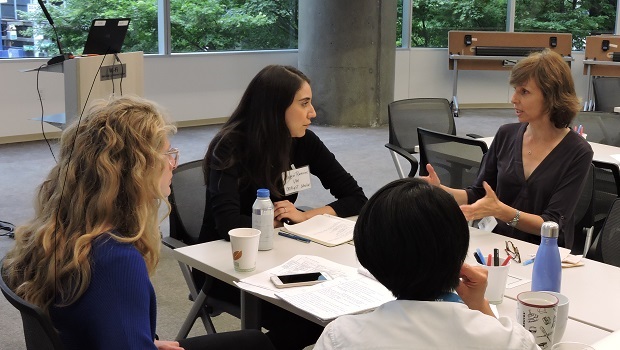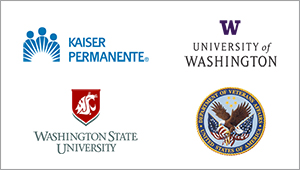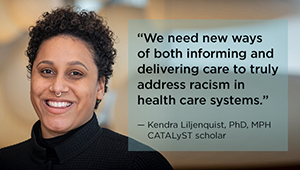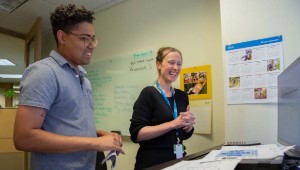Scholars and mentors strengthen bridge between research and care delivery

Former CATALyST scholar Maggie Ramirez (center) speaks with program co-director Paula Lozano (far right).
New paper shows mentorship boosts evidence-based, patient-centered care
What if inspiring early-career health researchers while also benefiting from their expertise was a part of everyday life in learning health systems? This is happening now in learning health system (LHS) training programs, where LHS leaders (mentors) are discovering new knowledge by working alongside and mentoring early-career researchers (scholars). Together they are conducting LHS research — research embedded in real-world health systems — while also helping those systems engage in continuous learning and accelerate care transformation.
A recent special issue of Learning Health Systems features a paper discussing the novel concept of partnering mentors and scholars on work that connects research with care delivery partners and what the future of programs like this looks like.
The CATALyST K12 Learning Health System Scholar Program at Kaiser Permanente Washington Health Research Institute (KPWHRI) is one of 11 LHS Centers of Excellence (COEs) across the country that started a training initiative for future leaders of LHS research. The COEs are funded by the Agency for Healthcare Research and Quality (AHRQ) and the Patient-Centered Outcomes Research Institute (PCORI). “K12” refers to a federal award that funds protected time for early-career research scientists to obtain training that can be leveraged toward future independent research. K12 LHS training programs are still a novel and evolving endeavor and, until recently, there was little focus on how to share the unique skills of LHS researchers with early-career scientists.
The paper’s lead author is CATALyST co-director Paula Lozano, MD, MPH, a senior investigator at KPWHRI. Her coauthors are the program directors at the other 10 COEs.
“Four years into the initiative, there is considerable, albeit early, evidence of scholars' collective accomplishments in learning and applying the skills of LHS research,” said Lozano.
Mutually beneficial training
LHS training programs differ from others because scholar success is defined in terms of both partnership and impact. Other training programs are focused on research or clinical effectiveness. LHS scholars receive mentoring in the development of stakeholder partnerships to inform their research approaches and enhance the relevance and impact of their findings. Scholars can also benefit from operational leadership opportunities that position them to influence health system decision-making.
“I am inspired by these scholars and the work they are doing,” said Lozano. “We started with a goal to influence early-stage researchers to think about the health systems that they want to work in, but we got so much more out of it. They really add value to the systems they are in.”
The partnership is mutually beneficial from a scholar’s perspective as well.
“Having support from mentors with diverse areas of expertise was invaluable to my career development as I sought to establish an independent line of LHS research,” said Yates Coley, PhD, a 2020 graduate of the CATALyST program and an associate biostatistics investigator at KPWHRI. “Mentors were able to consult on my hands-on partnerships with health systems leaders as well as my peer-reviewed publications and grant applications. I was successful in obtaining funding to continue my research developing statistical methods to improve equity of clinical prediction models because of the mentorship I received.”
(The special issue of Learning Health Systems also published a paper by Coley and other CATALyST scholars.)
Connecting research with care delivery
In their paper, Lozano and her coauthors also focus on the vital connection between research and care delivery, which is a novel concept to come from K12 LHS training programs. With support of the mentors, scholars reach out to care delivery partners (clinical staff) to find out what research would benefit their patient care and then write research grants based on these discussions. This connection continues through the lifecycle of research and care delivery.
The Adolescent Integrated Mental Health Pilot is an example of CATALyST scholars collaborating with care delivery partners. Led by KPWHRI Assistant Investigator and now-graduated CATALyST scholar Gwen Lapham, PhD, MPH, MSW, the pilot focused on expanding Kaiser Permanente Washington’s program for adult integrated mental health care to adolescents ages 13 to 17.
The secret sauce to K12 programs like CATALyST is the relationship-building that happens between the early-career researchers and clinical staff. Mentors train the scholars on how to involve care delivery partners early on because this relationship is what supports LHS work.
“I can’t sing the praises enough of working with LHS researchers,” said Maria N. Coghill, director of mental health and wellness at Kaiser Permanente Washington. “Working with CATALyST has helped us tackle challenging problems, infused evidence-based research into how we solve problems, ensured solutions are implemented sustainably, and given us creative patient-centered approaches.”
Looking to the future
The paper found it will be important to learn from the experiences of K12 LHS training programs like CATALyST to keep training programs like this running. Care delivery partners need to know how valuable the work of LHS training programs is — not only in training early-career scientists but also in building a stronger connection between research and care delivery.
The paper explains that LHS leaders are still learning how best to support early-career scientists, who have the difficult challenge of navigating health system operations while also learning research methods and working toward career independence.
LHS training programs need LHS researchers who want to be a part of training efforts, which, according to the paper, should focus on partnership and sustainability, including organizational support for scholar activities. And LHS leaders must understand the value of the LHS vision.
“In order for learning health systems to continue successfully, health care leaders must see the worth of them,” said Lozano. “I see huge value in the scholars I’ve worked with. They are developing the ways of the future, benefiting the health systems they are in, and their successes will help showcase the value of the training programs.”
CATALyST stands for Consortium for Applied Training to Advance the Learning health system with Scholars/Trainees. CATALyST is a partnership of Kaiser Permanente Washington, the University of Washington, the Veterans Affairs Puget Sound Health Care System, and the Washington State University College of Medicine.
By Marya Purrington
Learn More

CATALyST K12 Washington Learning Health System Scholar Program
An exciting opportunity for early-career health services scientists who want training in learning health system (LHS) research.
Visit the CATALySt home page.
News

A call for stronger focus on health equity in learning health systems training
Early-career scientists provide steps to a more equitable future.
Healthy findings blog

A practical roadmap to guide learning health systems
Claire Allen shares how a new paper from our LHS Program can help learning health systems move from concept to reality.



